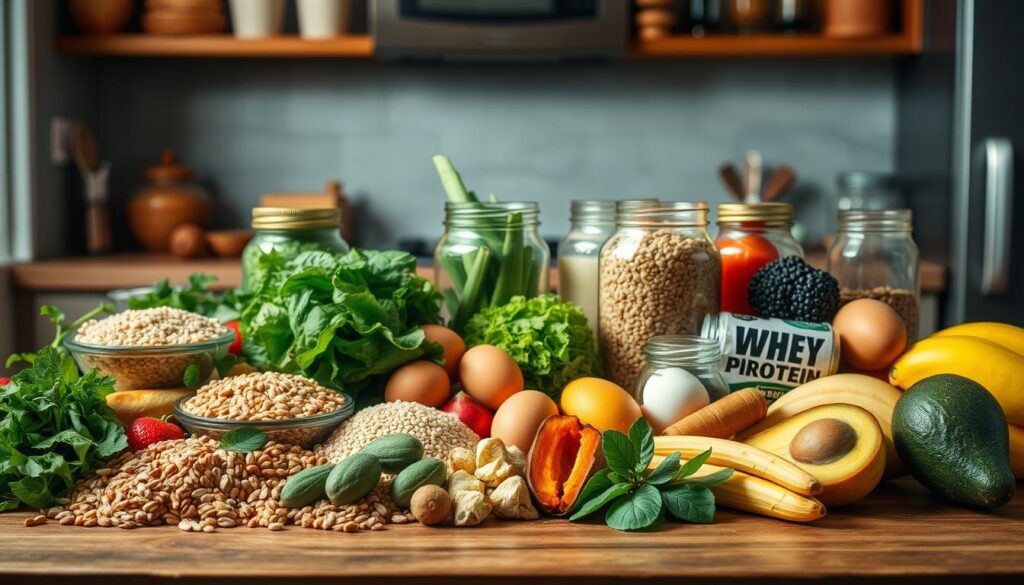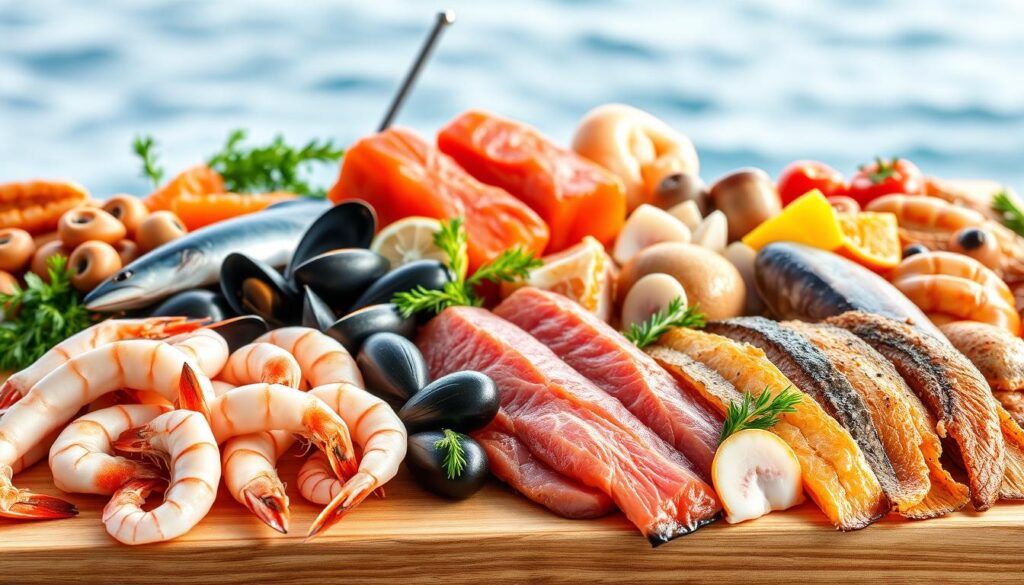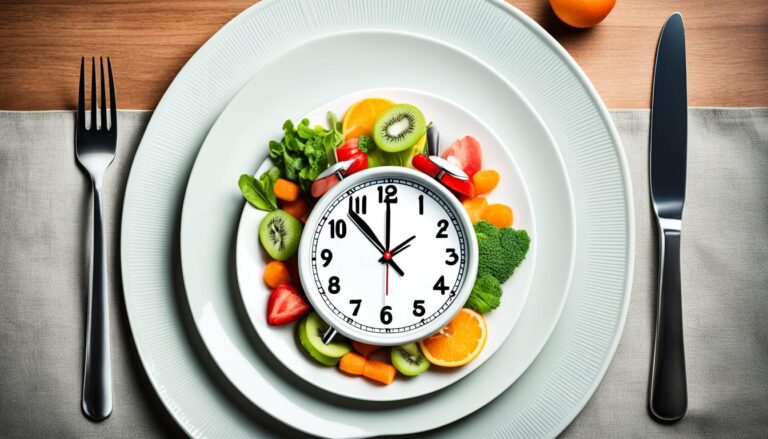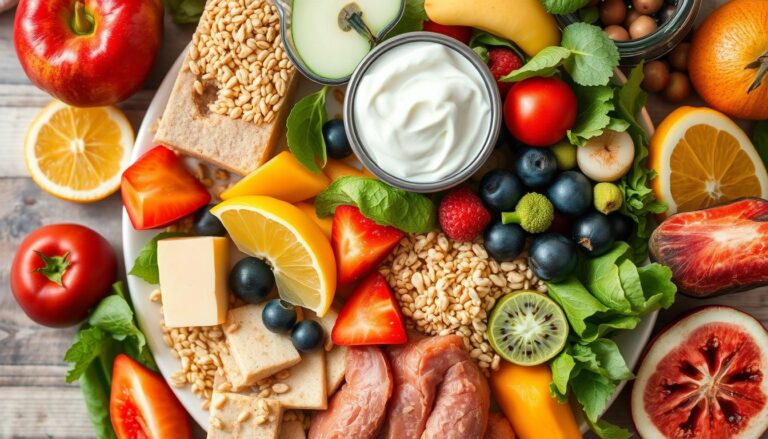Can the right nutrition really accelerate muscle growth and enhance overall health?
For individuals engaged in strength training and fitness regimens the answer lies in understanding the critical role of protein and a well-balanced diet plays in building and maintaining lean muscle mass.
Research indicates that consuming 1.4-2 grams of protein per kilogram of body weight daily, alongside resistance training, is key to maximizing muscle synthesis. A diet rich in quality proteins, complex carbohydrates, and healthy fats is essential for creating an optimal environment for muscle development and recovery.
Key Takeaways
- Consuming 1.4-2 grams of protein per kilogram of body weight daily supports muscle synthesis.
- A balanced diet including quality proteins, complex carbohydrates, and healthy fats is crucial.
- Nutrition and exercise work synergistically to build and maintain lean muscle mass.
- Proper nutrient timing and caloric intake are vital for effective muscle development.
- A well-rounded nutritional approach enhances muscle recovery and growth.
The Science Behind Muscle Growth
Understanding the science behind muscle growth is crucial for developing an effective muscle-building regimen. Muscle growth, or hypertrophy, involves a complex interplay of physiological processes that are influenced by both nutrition and exercise.
How Muscles Grow and Repair
Muscle growth occurs when muscle fibers are subjected to stress, typically through resistance training, causing micro-tears that necessitate repair. The repair process involves the synthesis of new proteins to rebuild and strengthen muscle fibers, a process known as muscle protein synthesis MPS. Adequate protein intake is essential to provide the necessary amino acids for MPS.
The Role of Nutrition in Muscle Development
Nutrition plays a pivotal role in muscle development by providing the necessary building blocks and energy for growth. Key nutritional elements include:
- Protein: Provides amino acids necessary for muscle repair and growth.
- Carbohydrates: Fuel workouts and replenish glycogen stores, supporting recovery and performance.
- Dietary fats: Support hormone production, including testosterone and growth hormone, which regulate muscle growth.
- Caloric intake: A moderate surplus of 250-500 calories above maintenance is generally required to support muscle growth.
- Micronutrients: Vitamins and minerals serve as cofactors in energy production, protein synthesis, and recovery.

By understanding the nutritional requirements for muscle growth, individuals can tailor their diet to support their muscle-building goals effectively.
What Are the Best Foods for Muscle Growth?
The right nutrition is fundamental to muscle growth, and certain foods stand out for their ability to support this process. A well-balanced diet that includes the appropriate amounts of protein, carbohydrates, and fats is crucial for individuals looking to build muscle.
Optimal Protein Intake for Muscle Building
Protein is a critical component of a muscle-building diet, providing the necessary building blocks for muscle tissue. The International Society of Sports Nutrition recommends that individuals engaged in resistance training consume sufficient protein to support muscle growth and repair. Aim for 1.6-2.2 grams of protein per kilogram of body weight daily to maximize muscle protein synthesis.
High-quality protein sources include lean meats, fish, eggs, and dairy products. These foods provide essential amino acids that the body cannot produce on its own. Incorporating a variety of protein sources into your diet can help ensure you’re meeting your daily protein needs.
Balancing Macronutrients for Maximum Results
While protein is crucial for muscle building, carbohydrates and fats also play important roles. Carbohydrates replenish glycogen stores in the muscles and liver, helping to avoid fatigue during training. The International Society of Sports Nutrition suggests that consuming 45% to 55% of daily calories as carbohydrates is sufficient for a general fitness program.
| Macronutrient | Recommended Daily Intake | Role in Muscle Growth |
|---|---|---|
| Protein | 1.6-2.2 grams/kg body weight | Muscle tissue building and repair |
| Carbohydrates | 45-55% of total calories | Replenish glycogen stores, energy for workouts |
| Fats | 20-35% of total calories | Support hormone production |
Healthy fats, comprising 20-35% of total calories, support hormone production necessary for muscle growth. Creating a slight caloric surplus, approximately 250-500 calories above maintenance, provides the energy necessary for new muscle tissue formation without excessive fat gain.

High Quality Animal Proteins for Muscle Development
Animal proteins are considered high-quality due to their complete amino acid profile, which is vital for muscle development. These proteins provide the necessary building blocks for muscle growth and repair. A well-balanced diet that includes a variety of animal proteins can support muscle health and overall fitness goals.

Chicken and Turkey Lean Protein Powerhouses
Chicken and turkey are excellent sources of lean protein, essential for muscle growth. A 3-ounce serving of chicken breast contains about 26 grams of protein. These lean meats are not only rich in protein but also low in fat, making them ideal for those looking to build muscle without consuming excessive calories.
Eggs The Complete Protein Source
Eggs are a complete protein source, meaning they contain all nine essential amino acids necessary for muscle repair and growth. One large egg provides about 6 grams of protein. The protein content in eggs supports muscle development and can be a valuable addition to a muscle-building diet.
Lean Beef and Bison Red Meat Options
Lean cuts of beef and bison are rich in high-quality protein and essential nutrients like iron and B vitamins. A 3-ounce serving of lean beef contains approximately 22-24 grams of protein. Bison, in particular, offers a leaner alternative to traditional beef, with less fat and comparable protein content. Consuming lean red meat can enhance muscle protein synthesis and support muscle growth.
As highlighted in a study published in the American Journal of Clinical Nutrition, consuming lean red meat in combination with resistance training can enhance muscle protein synthesis and strength gains. Consuming lean red meat in combination with resistance training enhances muscle protein synthesis and strength gains compared to isocaloric control diets, emphasizing the importance of lean meats in a muscle building regimen.
Seafood Options to Build Strength
For those seeking to enhance their muscle development, seafood offers a variety of options rich in protein and other vital nutrients. Seafood is not only a great source of high quality protein but also provides essential micronutrients that support overall health and muscle function.

Salmon and Fatty Fish Protein Plus Omega-3s
Salmon and other fatty fish are excellent choices for muscle growth due to their high protein content and rich omega-3 fatty acid profile. Omega-3s support muscle recovery and overall health, making these fish a valuable addition to a muscle-building diet. A 3-ounce serving of salmon provides approximately 20 grams of protein.
Tuna High Protein, Low Fat Option
Tuna is another seafood option that is high in protein and low in fat, making it an ideal choice for those looking to build muscle without consuming excessive calories. A 3-ounce serving of tuna contains about 25 grams of protein and less than 1 gram of fat.
Other Seafood Choices for Muscle Growth
Other seafood options like shrimp, scallops, and crab are also beneficial for muscle growth. Shrimp, for example, is almost pure protein, with a 3-ounce serving containing 19 grams of protein. Scallops provide about 17 grams of protein per 3-ounce serving with very little fat. These shellfish varieties offer exceptional protein-to-calorie ratios and are rich in minerals like zinc and copper, which support immune function and overall health.
Dairy Products That Support Muscle Building
Dairy products play a crucial role in supporting muscle building due to their high-quality protein content. They offer a range of options that can be tailored to individual needs, whether for immediate post workout recovery or sustained muscle support.
Greek Yogurt Protein-Packed Recovery Food
Greek yogurt is an excellent choice for post-workout recovery, providing a high dose of protein to help repair and build muscle. Its thick consistency and rich nutritional profile make it a popular choice among athletes and fitness enthusiasts. With approximately 20 grams of protein per cup, it supports muscle recovery and growth.
Cottage Cheese: Slow Digesting Protein Source
Cottage cheese is another valuable dairy product for muscle building, offering a slow-digesting protein source that provides a sustained release of amino acids. This helps maintain a positive nitrogen balance, crucial for muscle growth and repair. It’s particularly beneficial when consumed before bedtime.
Milk and Whey Protein Fast Absorbing Options
Milk and whey protein are fast-absorbing dairy products that support muscle building. Milk contains both fast-digesting whey protein and slow-digesting casein protein, making it versatile for different needs. Whey protein is particularly effective post-workout, rapidly delivering essential amino acids to promote muscle recovery and growth, potentially increasing lean mass.
In conclusion, dairy products like Greek yogurt, cottage cheese, milk, and whey protein are invaluable for muscle building due to their high-quality protein content and versatility. Incorporating these into a balanced diet can significantly support muscle growth and recovery.
Plant Based Proteins for Muscle Development
A well-planned plant based diet can provide all the necessary protein for muscle growth and repair. This is crucial for individuals who follow a vegetarian or vegan lifestyle but still aim to build muscle.
Legumes Beans Lentils, and Chickpeas
Legumes are a staple in many plant-based diets and offer a rich source of protein. Beans, lentils, and chickpeas are not only versatile but also packed with essential amino acids necessary for muscle repair.
- Black beans contain about 15g of protein per 1 cup cooked.
- Lentils provide approximately 18g of protein per 1 cup cooked.
- Chickpeas offer around 15g of protein per 1 cup cooked.
Soy Products: Tofu Tempeh and Edamame
Soy products are another excellent source of plant-based protein. Soy protein isolate contains 25g of protein per 1-oz serving, making it a valuable addition to a muscle-building diet.
Tofu, tempeh, and edamame are not only rich in protein but also provide essential amino acids necessary for muscle development.
Plant Based Protein Powders
Plant-based protein powders have evolved to become a convenient and effective way to boost protein intake. Modern formulations often combine pea, rice, hemp, and pumpkin seed proteins to create a complete amino acid profile.
| Protein Source | Protein Content per Serving |
|---|---|
| Pea Protein Isolate | 24-27g per 30g serving |
| Soy Protein Isolate | 25g per 1-oz serving |
| Rice Protein | 15-18g per 1 scoop |
As noted by a study published in the Journal of the International Society of Sports Nutrition, pea protein supplementation can produce muscle strength and thickness gains comparable to whey protein when consumed in the context of resistance training.
Carbohydrates and Grains for Energy and Recovery
To optimize muscle growth and recovery, it’s essential to consume the right types of carbohydrates and grains. These nutrients provide the energy needed for intense workouts and help replenish glycogen stores afterward.
Quinoa The Protein Rich Grain
Quinoa is a valuable addition to a muscle-building diet due to its high protein content and complex carbohydrates. It provides approximately 8g of protein per cup, making it an excellent source of nutrients for muscle repair and growth.
Brown Rice and Other Whole Grains
Brown rice and other whole grains are rich in complex carbohydrates, fiber, and various vitamins and minerals. They help provide sustained energy release and support overall nutritional balance.
| Grain | Protein Content g/cup | Carbohydrate Content g/cup |
|---|---|---|
| Quinoa | 8 | 39 |
| Brown Rice | 5 | 45 |
| Sweet Potatoes | 2 | 27 |
Sweet Potatoes and Complex Carbs
Sweet potatoes are an excellent source of complex carbohydrates, offering approximately 25-30 grams per cup. They have a moderate glycemic index, making them suitable for both pre- and post-exercise nutrition.
Consuming complex carbohydrates like sweet potatoes and whole grains is crucial for muscle recovery and growth. They provide the necessary energy for exercise and help replenish glycogen stores.
Healthy Fats That Support Muscle Growth
Healthy fats play a crucial role in supporting muscle growth and overall health. While protein is often the focus for muscle development, healthy fats are equally important for hormone production and overall well-being.
Nuts and Seeds Protein and Healthy Fats
Nuts and seeds are not only rich in healthy fats but also provide a good amount of protein, making them an excellent snack for those looking to build muscle. Examples include almonds, walnuts, chia seeds, and flaxseeds. These foods are also rich in various micronutrients and antioxidants that support overall health.
A comparison of nuts and seeds reveals their nutritional benefits:
| Nut/Seed | Protein Content g | Healthy Fats g | Calories |
|---|---|---|---|
| Almonds 1 oz | 6 | 14 | 161 |
| Chia Seeds 1 oz | 5 | 9 | 100 |
| Walnuts 1 oz | 4 | 18 | 185 |
Avocados and Olive Oil Monounsaturated Fat Sources
Avocados and olive oil are rich in monounsaturated fats, which support testosterone production and reduce inflammation. Avocados provide approximately 15 grams of monounsaturated fat per fruit, along with 3 grams of protein and 9 grams of fiber, making them a nutrient-dense choice for muscle development and overall health.
Monounsaturated fats from sources like avocados and olive oil are crucial for optimizing hormonal environments for muscle growth. The oleic acid in these foods has been shown to reduce exercise-induced inflammation and support cell membrane fluidity, potentially enhancing nutrient delivery to muscle tissue.
Conclusion Creating a Muscle Building Meal Plan
A well designed nutrition plan is the cornerstone of successful muscle development. To build muscle effectively, it’s crucial to consume the right amount of protein and balance it with other macronutrients.
Research indicates that individuals aiming to build muscle mass should consume around 1.6-2.2 grams of protein per kilogram of body weight per day, spread across 4-6 meals. Timing nutrition around workouts is also vital, with pre workout meals focusing on easily digestible proteins and carbohydrates, and post-workout nutrition emphasizing rapid delivery of protein and carbs to accelerate recovery.
A moderate caloric surplus of 250-500 calories above maintenance needs supports new muscle tissue formation. Additionally, staying hydrated plays a crucial role in muscle development. While whole foods should be the foundation of the diet, strategic supplementation can address specific nutritional gaps.





